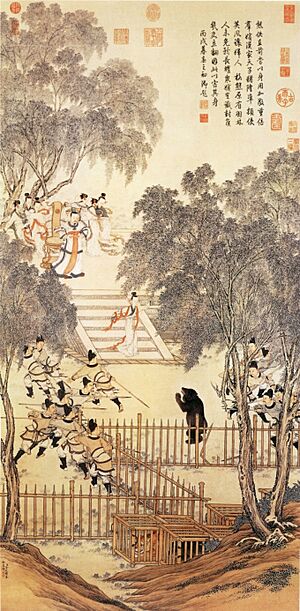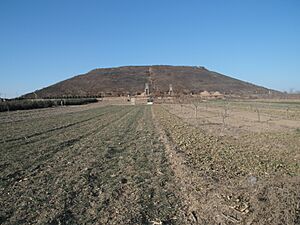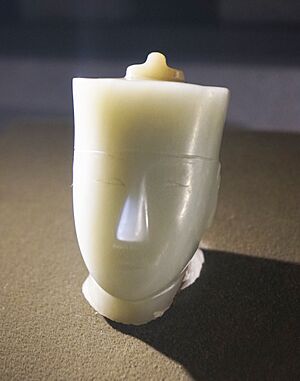Emperor Yuan of Han facts for kids
Quick facts for kids Emperor Yuan of Han |
|||||||||
|---|---|---|---|---|---|---|---|---|---|

Jieyu Fighting against Bear by Jin Tingbiao, Palace Museum, China. Emperor Yuan was depicted at the top of the flight of steps.
|
|||||||||
| Emperor of the Han dynasty | |||||||||
| Reign | 29 January 48 – 8 July 33 BC | ||||||||
| Predecessor | Emperor Xuan | ||||||||
| Successor | Emperor Cheng | ||||||||
| Born | 75 BC Chang'an, Han Empire |
||||||||
| Died | 8 July 33 BC (aged 42) Chang'an, Han Empire |
||||||||
| Burial | Wei Mausoleum (渭陵), Xianyang | ||||||||
| Consorts | Empress Xiaoyuan Consort Fu Consort Feng Consort Wei |
||||||||
| Issue | Emperor Cheng of Han Liu Kang, Prince Gong of Dingtao Liu Xing, Prince Xiao of Zhongshan Princess Pingdou Princess Pingyang Princess Yingyi |
||||||||
|
|||||||||
| House | Liu | ||||||||
| Dynasty | Han (Western Han) | ||||||||
| Father | Emperor Xuan | ||||||||
| Mother | Empress Gong'ai | ||||||||
| Emperor Yuan of Han | |||||||||||||||||||
|---|---|---|---|---|---|---|---|---|---|---|---|---|---|---|---|---|---|---|---|
| Traditional Chinese | 漢元帝 | ||||||||||||||||||
| Simplified Chinese | 汉元帝 | ||||||||||||||||||
| Literal meaning | The Primal Emperor of Han | ||||||||||||||||||
|
|||||||||||||||||||
| Alternative Chinese name | |||||||||||||||||||
| Traditional Chinese | 劉奭 | ||||||||||||||||||
| Simplified Chinese | 刘奭 | ||||||||||||||||||
| Literal meaning | (personal name) | ||||||||||||||||||
|
|||||||||||||||||||
Emperor Yuan of Han, whose personal name was Liu Shi (劉奭; 75 BC – 8 July 33 BC), was an emperor of the Chinese Han dynasty. He ruled from 48 BC to 33 BC. Emperor Yuan made Confucianism the official way of thinking for the Chinese government. He gave important jobs to people who followed the ideas of Confucius.
However, even as he made Confucianism stronger, the empire faced problems. This was partly because he found it hard to make firm decisions. He also struggled to stop arguments between officials in his government. Sometimes, he trusted officials who were not honest. His son, Emperor Cheng, became the next ruler.
Contents
Early Life and Becoming Crown Prince
Liu Shi was born in 75 BC. His father, Liu Bingyi, and mother, Xu Pingjun, were not royalty at the time. Liu Bingyi was a great-grandson of Emperor Wu. His grandfather, Liu Ju, was once a crown prince. But Liu Ju died in a rebellion, and his family was executed. Liu Bingyi was saved because he was just a baby.
When Liu Shi was less than a year old, his father's life changed. The regent, Huo Guang, chose Liu Bingyi to be the new emperor. He became Emperor Xuan. Liu Shi's mother, Xu Pingjun, became the empress.
A Sad Loss and New Empress
Sadly, Empress Xu died in 71 BC. Huo Guang's wife, Lady Xian, wanted her own daughter, Huo Chengjun, to be empress. Lady Xian bribed a doctor to give Empress Xu medicine that caused her death after she gave birth.
In 70 BC, Emperor Xuan made Huo Chengjun the new empress. She loved luxury, spending much more than the previous empress.
Empress Huo becoming empress put young Prince Shi in danger. In 67 BC, Emperor Xuan made the eight-year-old Prince Shi the Crown Prince. He also gave Prince Shi's grandfather, Xu Guanghan, an important title. Lady Xian was very unhappy. She told her daughter, Empress Huo, to try and harm the crown prince. Empress Huo reportedly tried several times but failed.
Later, Emperor Xuan heard rumors that the Huo family had caused Empress Xu's death. He began to take away their power. In 66 BC, Lady Xian admitted to her family that she had caused Empress Xu's death. The Huo family then planned to remove the emperor. But their plan was discovered. Emperor Xuan had the entire Huo family executed. Empress Huo was stripped of her titles and later took her own life.
After this, Emperor Xuan chose a new empress. He picked Consort Wang in 64 BC. She was kind and had no children of her own. Emperor Xuan asked her to care for Crown Prince Shi, and she looked after him very well.
Crown Prince's Education and Challenges
As a crown prince, Liu Shi learned about Confucian classics from many scholars. He grew up to be a gentle person who strongly believed in Confucian ideas. This was different from his father, Emperor Xuan, who used both Confucian and Legalist ideas to rule.
In 53 BC, Prince Shi suggested that his father use more Confucian officials. Emperor Xuan became very angry. He said that Confucian scholars were not practical. He even worried that Prince Shi's rule might lead to problems for the Liu family. Emperor Xuan thought about making Prince Shi's younger brother, Liu Qin, the crown prince instead. But he remembered his love for Prince Shi's mother, Empress Xu, and decided not to change his heir.
In 49 BC, Emperor Xuan became very ill. Before he died, he chose some trusted officials to help Prince Shi rule. After his father's death, Prince Shi became Emperor Yuan.
Emperor Yuan's Reign
As emperor, Yuan immediately started to cut down on government spending. He wanted to make life easier for the people. He also began programs to help the poor and new business owners. Unlike his father, he relied heavily on Confucian scholars. He gave them important government jobs.
In 48 BC, Emperor Yuan made Consort Wang Zhengjun, the mother of his first son, Empress. In 47 BC, he made Prince Ao the crown prince.
In 46 BC, Emperor Yuan decided to stop occupying Hainan island. It was too expensive and there were many rebellions there. In 40 BC, he also reduced the number of imperial temples. This was to save money on their upkeep.
Challenges from Within the Court
Early in Emperor Yuan's rule, arguments started between different groups of officials. This fighting lasted his whole reign. It made officials focus on arguing instead of governing well. One group included Confucian scholars. The other group was made up of officials who were close to the emperor, like the chief eunuch Shi Xian.
These groups often disagreed on how to run the government. The Confucian group wanted to return to older ways of ruling. The court group wanted to keep the current Han Dynasty traditions. The fighting between them often led to officials being removed from their positions.
For example, in 47 BC, some officials used tricks to get Confucian scholars demoted. Later, Emperor Yuan brought some of them back. But the fighting continued. Shi Xian and his allies often accused those who disagreed with them. This caused many good officials to lose their jobs or even their lives.
Military Successes and Central Asia
Despite the internal struggles, Emperor Yuan's reign saw important military successes. The Xiongnu, a powerful nomadic group, had split into two parts. One leader, Chanyu Huhanye, became an ally of the Han Dynasty. The other, Chanyu Zhizhi, was more powerful and often attacked Han's allies.
In 36 BC, two Han commanders, Gan Yanshou and Chen Tang, decided to act against Zhizhi. Zhizhi had become very arrogant. He treated his allies badly and even executed the daughter of the king of Kangju. Chen Tang believed Zhizhi was a growing threat. He planned to attack Zhizhi's capital, which was not well protected.
Chen Tang took a bold step. He forged imperial orders to gather Han and allied forces. They marched to Zhizhi's capital and surrounded it. In the battle, Chanyu Zhizhi was killed. This was a major victory for the Han Dynasty. It showed Han's power over the western regions.
After this victory, Chanyu Huhanye visited the Han capital in 33 BC. He asked to become a "son-in-law of Han." Emperor Yuan gave him five ladies-in-waiting, including the beautiful Wang Zhaojun. Huhanye was very impressed. He offered to have his forces protect Han's northern borders. Emperor Yuan declined this offer, but the relationship between Han and the Xiongnu became much stronger.
Who Would Rule Next?

Emperor Yuan had two other favorite concubines besides Empress Wang. They were Consort Fu and Consort Feng Yuan. Each had a son. Empress Wang tried to get along with them, and she mostly succeeded with Consort Feng. However, Consort Fu and Empress Wang had a rivalry over which of their sons would become the next emperor.
As Crown Prince Ao grew older, Emperor Yuan became less happy with him. He was more impressed with Consort Fu's son, Prince Kang. One reason for this was in 35 BC. Emperor Yuan's younger brother, Prince Liu Jing, died. Emperor Yuan felt that Crown Prince Ao was not sad enough, especially since they were similar in age and grew up together.
As the princes got older, Emperor Yuan and Prince Kang became closer. They both loved music and playing drums. When Emperor Yuan became ill in 35 BC, Consort Fu and Prince Kang were often by his side. Empress Wang and Crown Prince Ao were rarely called. During his illness, Emperor Yuan thought about making Prince Kang his heir.
However, a trusted official named Shi Dan stepped in. He risked his life to convince Emperor Yuan not to change the heir. When Emperor Yuan died in 33 BC, Crown Prince Ao became the new emperor, known as Emperor Cheng.
Era Names
- Chuyuan (初元): 48 BC – 44 BC
- Yongguang (永光): 43 BC – 39 BC
- Jianzhao (建昭): 38 BC – 34 BC
- Jingning (竟寧): 33 BC
Family
Emperor Yuan had several consorts and children:
- Empress Xiaoyuan, of the Wang clan (孝元皇后 王氏; 71 BC – 13 AD)
- Liu Ao, Emperor Xiaocheng (孝成皇帝 劉驁; 51–7 BC), his first son
- Zhaoyi, of the Fu clan (定陶共王母 傅氏; died 2 BC)
- Princess Pingdou (平都公主)
- Liu Kang, Emperor Gong (恭皇 劉康; died 23 BC), his second son
- Zhaoyi, of the Feng clan (昭儀 馮氏; died 6 BC)
- Liu Xing, Prince Xiao of Zhongshan (中山孝王 劉興; died 8 BC), his third son
- Jieyu, of the Wei clan (婕妤 衛氏)
- Princess Pingyang (平陽公主)
- Unknown mother
- Princess Yingyi (潁邑公主)
- Married Du Ye (杜業)
- Princess Yingyi (潁邑公主)
See also
- Family tree of the Han Dynasty
 | Valerie Thomas |
 | Frederick McKinley Jones |
 | George Edward Alcorn Jr. |
 | Thomas Mensah |


